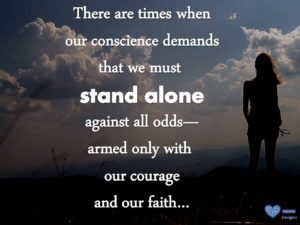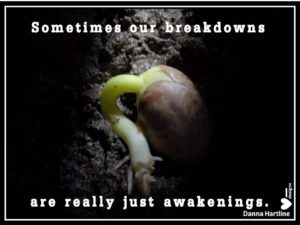Are Happiness and Dissonance in Opposition?
Recently, I saw a meme on Facebook that said in essence, “The longer I live, the more I want to stay away from drama, conflict, or stress and just live a happy life, surrounded by friends, eating good food in my cozy house.” Doesn’t that sound appealing and even right? It received lots of likes and affirmative comments.
that said in essence, “The longer I live, the more I want to stay away from drama, conflict, or stress and just live a happy life, surrounded by friends, eating good food in my cozy house.” Doesn’t that sound appealing and even right? It received lots of likes and affirmative comments.
But I couldn’t help but ask myself, “What about those who do not feel that kind of life is available to them? What about those who feel thrown into a life that is filled with conflict and drama, a life they didn’t ‘ask for?’ What about facing wrongs that need a voice?” Probably most of us want—or think we want—equilibrium. We are all on the search for happiness, aren’t we? Mormons are particularly riveted on this pursuit. On the surface, it seems that we, as Mormons, are doing pretty well. After all, Utah, which is 70% LDS, is numbered as the eighth happiest state in the nation! That’s so cool! Really! Lots of happy living there. It’s true.
But we must look at this closer. Perhaps you also know that Utah also has one of the highest suicide rates in the nation. But how could that be? How could a culture that produces such happiness have such a counter response? Well, first we know that there is opposition in all things. It can be a very disturbing reality to be unhappy—to not feel like you are “getting it,” to feel “insufficient”—in an environment where everyone else around you seems to be thriving and doing great (Baumeister & Bushman, 2017).
And yet this is often the counter response in happy cultures. In fact, did you also know that one in five women in Utah are on anti-depressant medications, making it the highest ranked state for depression in the nation, doubling the national average? (It also has the highest mental illness in the nation.)
What is the cause here? Is this a reflection of how many feel and respond when they don’t “fit” the perfect Mormon mold? One psychiatrist seems to think so. Speaking about women, he stated: “In the Mormon culture females are supposed to accept a calling. They are to be constantly smiling over their family of five. They are supposed to take supper across the street to an ill neighbor and then put up with their husband when he comes home from work and smile about it the whole time. There is this sense that Mrs. Jones down street is doing the same thing, and there is this undercurrent of competition. To be a good mother and wife, women have to put on this mask of perfection. They can’t show their tears, depression or agony.”
A few days ago, I witnessed a lady say to several other ladies who were struggling with the Mormon culture to “suck it up” and that anyone who had personal conflict or hardships is filled with pride and doesn’t have enough faith in Christ, as if one can time table healing and command the elements of heaven. As the struggling ladies tried to state the complexity of their positions, the other lady responded, “Blah, blah, blah…That has nothing to do with the teachings of Christ. You need to learn how to believe Christ, not just believe in Christ. Then your life will be better.” The battle between them continued pretty intensely until a man came into the discussion. He announced the winner: The “blah, blah, blah” lady was right. He quoted David A. Bednar and shut down all discussion. All the struggling ladies cowered down and the discussion came to an abrupt end, except for the “winner,” who claimed her victory and gave her final speech.
I was amazed at what I had just witnessed. I kept wondering what had just happened. Why did everyone just back out and complete silence resulted? First, I think the struggling women were exhausted. They didn’t want to fight in that forum anymore. It had taken such courage to even make an unpopular stand. Add a male figure, who seemed to take on the authority role, who put a halt to it all. He brought the “enlightenment” and “peace” that apparently was so needed.
I don’t like that! I don’t like how sometimes we act as if everything always has to be in perfect harmony, that if there is any dissonance (which is a lack of harmony, a clash resulting from a combination of two disharmonious or unsuitable elements), it is a shameful occurrence. Dissonance doesn’t mean “bad” or “wrong.” It’s like two clouds coming together in the sky. When they connect, it makes storms. It’s also like keys on the piano. Two notes may not sound well together but that doesn’t make one “bad” and other “good.”
Further, we forget that not all harmony or equilibrium is good, and is in fact, often very harmful (Sotillos, 2013). Many feel quite content with complacency and insensitivity, which are states of equilibrium as much as peace and contentment are. There are inner balances in such apathetic stances; and to be sure, one can easily find many friends to join them in these states, which include delectably good food and a cozy meeting place.
But I cannot help but ponder on the score of people in history that we applaud and honor for leading lives just opposite of ease. People who lived lives of incredible dissonance—lives of intense stress, conflict, and drama, all because real issues needed to be addressed—action needed to be taken to help others who were oppressed, who were misunderstood, who didn’t have a voice. People like Abraham Lincoln, Martin Luther, Mother Teresa, Martin Luther King, Jr., and yes,  Jesus Christ lived lives of great unease. All of these people “endured a great fight of afflictions” (Hebrews 10:32), not ease, because they knew some changes needed to be made and their voices were needed. They were willing to act, no matter the cost.
Jesus Christ lived lives of great unease. All of these people “endured a great fight of afflictions” (Hebrews 10:32), not ease, because they knew some changes needed to be made and their voices were needed. They were willing to act, no matter the cost.
Bringing about change is hard. But sometimes we have to speak up! When we see something that isn’t right, if we don’t take on the cause, who will?  How will change ever take place if we all sit back eating chocolate-chip cookies in our cozy houses filled with people who also desire nothing but immediate synchronization? I do not believe that is true Christ-centered living. Rather, the Savior’s example teaches me, at least, that true happiness often comes through the means of dissonance, much like two clouds clashing bring forth much needed rain…
How will change ever take place if we all sit back eating chocolate-chip cookies in our cozy houses filled with people who also desire nothing but immediate synchronization? I do not believe that is true Christ-centered living. Rather, the Savior’s example teaches me, at least, that true happiness often comes through the means of dissonance, much like two clouds clashing bring forth much needed rain…
That doesn’t mean to seek the storms. It doesn’t mean to try to be in disharmony but maybe just to not get too worked up when it is apart of living. It need not cause us severe depression and confusion when everyone else seems to be having sunshine when we are not. We are not alone. There are others who struggle. And it could even be a good thing, because in truth, darkness and dis-equilibrium is quite often a necessity for true growth to occur.
**Think disagreements don’t have a place in the Church? Here’s some intriguing stories of when Church leaders haven’t seen eye-to-eye: Building Bridges




4 Comments
Brad
I have felt alone for years… Maybe there is yet hope for healing… Thank you.
LYDIA
Your writing is good. I liked the blog you attached as well. Poor women who were shut down. That is the kind of realism I like to see in the Church.
Darren
Keep up the work you are doing for the traumatized! They need to be heard. This is such unfamiliar territory. It needs a voice like yours. Thank you for being a crusader, for not settling for chocolate chip cookies and a life of ease. God bless you!
Mary Ann Smith
Thank you for speaking a truth many are “ashamed” to speak.